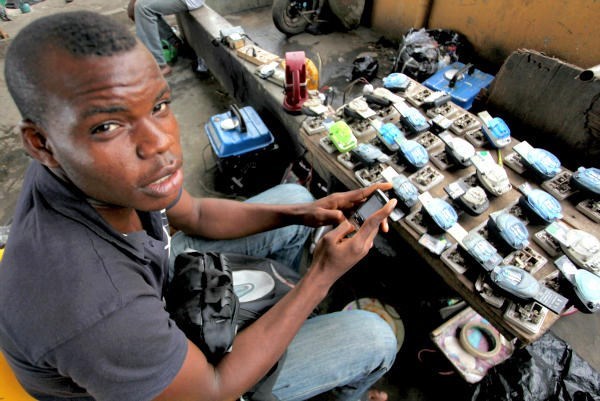 |
| Jamil Idriss charges 50 naira ($0.33) to recharge phone batteries by plugging them into a diesel generator in Lagos, Nigeria. Most of Nigeria is hampered by constant power outages, meaning his customers can't charge their own phones. Multifunction diesel generators are helping generate electricity and do other kinds of work all over Africa.
Akintunde Akinleye/Reuters/File |
In rural villages in East and West Africa, electrical connections are humming and light bulbs are shining for the first time in homes that only knew candlelight before.
Although no power lines yet reach these villages, multifunction platforms (MFPs) are filling the energy void, powering not just lights but machines that lessen the drudgery of farmers' work.
What is a multifunction platform? Though the name sounds a bit daunting, the MFP is basically a stationary diesel engine that can be attached to about anything that rotates: grain-milling and husking machines, water pumps, and power tools. The MFPs are quiet, 6 to 8 horsepower, 750-lb Listeroid engines. Their basic construction and features have not changed significantly since their debut in the 1930s.
The engines have more than proved their durability, efficiency, and hassle-free maintenance over the years. Their efficiency and raw power make them perfectly suited for continuous electrical generation and work.
With MFPs farmers can mill their own corn and wheat for food and sale, while earning income by processing the crops of neighboring farmers. Members of cooperatives can run mechanical tools, power rural electrical grids, and soon, it is hoped, irrigate crops with the machines.
Organizations working with the platform have paid special attention to women users, hoping to free up several hours per day that can be devoted to other priority tasks.
The first MFPs were installed in Mali and Burkina Faso in 1994 by the United Nations Industrial Development Organization and the International Fund for Agricultural Development. The United Nations Development Programme (UNDP) began to install MFPs in 1996, and the project is still ongoing, having expanded to include other countries in West Africa.
To acquire an MFP, a group of men and women from a village usually create a formal organization to request and purchase a generator. The cost is usually subsidized between 40 to 50 percent by the UNDP. Residents are given training and then placed in charge of installation, maintenance, and repair of the platforms.
In 2009, student engineers from Makerere University in Kampala, Uganda, and Columbia University in New York City installed two of these engines in the Teso region of northern Uganda, one of the first in East Africa. The students worked with a local NGO, Pilgrim, which had established several cooperatives in the area. The machines cost nearly $9,000, plus $3,350 to train people to use them.
With fuel prices varying greatly, access to diesel fuel to power the MFPs can be a challenge. In response, Columbia University students modified the platform to run on vegetable oil, which could decrease operating costs and ensure continued MFP use. In order to avoid using food crops for the oil, the engineers have recommended that users plant Jatropha, an inedible plant whose seeds have high oil content. With the right attachment, the MFPs themselves can extract the oil from the seeds. It is hoped that excess Jatropha plant oil can be sold to biodiesel distributors and soapmakers for additional income.
Page created on 9/18/2012 12:00:00 AM
Last edited 1/5/2017 8:58:21 PM
• Sheldon Yoder is a research intern with Nourishing the Planet. This article originally appeared at Nourishing the Planet, a blog published by the Worldwatch Institute.
